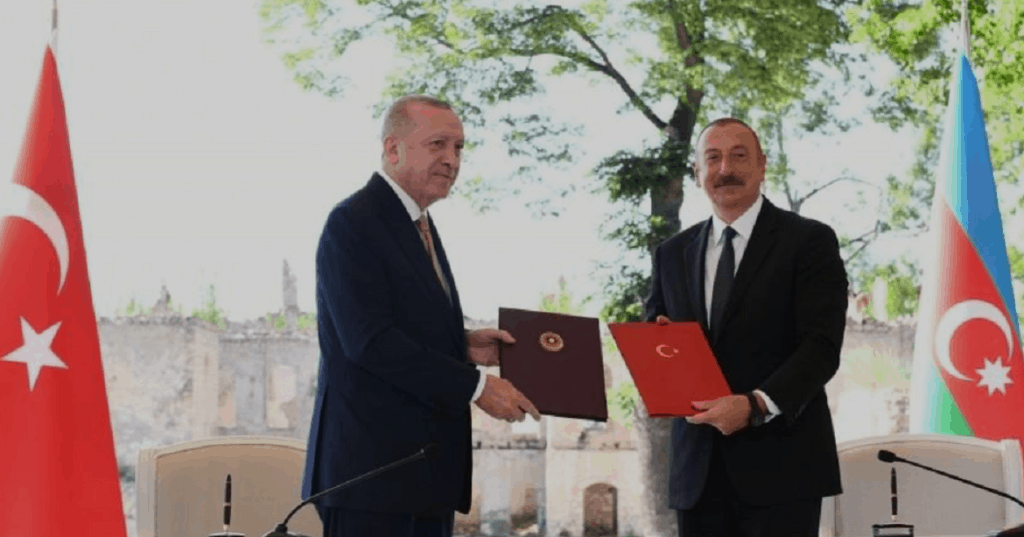By Anton Evstratov
The Shusha Declaration, signed by Azerbaijani and Turkish leaders Ilham Aliyev and Recep Tayyip Erdoğan, is not only a symbolic consolidation of the victory of the Azerbaijani-Turkish alliance in Karabakh, but also an extremely remarkable message for Armenia. It is evidence of the Turkish desire to establish new regional realities.

Undoubtedly, the Shusha document is a formal alliance, but there is nothing new here – de facto Azerbaijan and Turkey have long been allies, which was also evident during the 44-day war in Karabakh. Officers of the Turkish Armed Forces during the autumn aggravation in Nagorno-Karabakh controlled the work of the General Staff of the armed forces of Azerbaijan, trained and instructed Azerbaijani special forces units, and recruited pro-Turkish militia fighters in Syrian territory, who were also involved in the conflict by the Azerbaijani side.
On the other hand, the Shusha Declaration documents Turkish promises to join the restoration of Karabakh territories under Azerbaijani control and proceeds from the prospect of opening the Zangezur (Syunik) corridor through Armenian territory, which is intended to connect Azerbaijan with its exclave of Nakhichevan, which, in turn, has a border with Turkey. This contradicts Yerevan’s insistence on unblocking the transport routes, according to the joint trilateral statement of November 9, without granting the Turks any corridor, since the latter is perceived as a threat to the territorial integrity and sovereignty of Armenia.
Moreover, during the joint statement after the signing of the Shusha Declaration, the President of Azerbaijan Ilham Aliyev emphasized the continuity of the signed document in relation to the Kars Treaty of 1921, which was extremely painfully perceived by the Armenian side, because it had once deprived it of the territories of both Western and Eastern (Kars, Igdir) Armenia. Given that the Kars Treaty, contrary to the established order, has not been prolonged so far, there is the desire of Ankara to revise it from a position of strength, thus avoiding the threat of worsening its regional position.
Thus, it can be stated that the Shushi declaration is extremely aggressive and hostile towards the Armenian republics (Armenia and Artsakh), and even Erdogan’s statement that Turkey is ready to normalize relations with Yerevan, as well as for Armenia to join the all-regional economic initiatives, cannot fix that. In this context, Armenia is the defeated party, from which the winners now need only territory (and in the future – markets, with the possibility of withdrawal of production and other preferences). At the same time, the Turkish-Azerbaijani military alliance demonstrates its determination to force Yerevan to provide territory for transport corridors by military means as well.
For the moment this alliance can only be countered by Armenia’s own alliance with Russia, whose position on the situation in the region, however, is by no means hostile to that of Turkey and Azerbaijan.
Even more remarkable is the conditionally “intra-Armenian” case of the Shusha declaration. First, we should note the different reactions to the document and Erdogan’s visit to Shushi by the leaders of the two Armenian republics. While the Artsakh side called this visit illegal, the Armenian side defined it as a “provocation”. It is extremely important to note the precision of the diplomatic wording here, since provocation is not a crime in itself. Such a “soft” definition of what happened in Shushi by Armenia can also be considered a consequence of the possible agreement of its leadership to the realities that Erdoğan and Aliyev are offering to their country. First of all, this concerns the Zangezur corridor. Despite the repeated statements of the incumbent government members that in negotiations with the Azerbaijanis they do not proceed from the “corridor logic”, at the moment three different discourses on the issue among different political forces of Armenia can be stated.
The first one is an aspiration for the soonest unblocking of the transport routes with all the necessary concessions of Yerevan to the Turkic neighbors in order to ensure the economic benefits for the RA with the prospect of a gradual withdrawal of the alliance with Russia in the future. Deputy parliamentary speaker, Bloc member Lena Nazaryan and even some members of the government inadvertently made statements to that effect. Edmon Marukyan’s Enlightened Armenia and some other pro-Western parties of Armenia support this line in a milder form.
The second is the refusal to unblock the transport routes relying on Russia, notwithstanding the possibility of losing the remnants of Armenian sovereignty in favor of Moscow. Proponents of this discourse are ready to continue the political line of confrontation with Azerbaijan and Turkey, which was in place earlier, but de facto are not ready to fight not only for the liberation of the territories of Nagorno-Karabakh seized by Azeris, but also for Armenia itself, hoping for allied assistance from Russia and an increased number of Russian servicemen in Armenia. This line is defended by the supporters of Robert Kocharian (Armenia bloc), Artur Vanetsyan and Serzh Sargsyan (Honor bloc).
The third one is a war for territorial integrity of Armenia and an attempt of revenge in Karabakh with all the inevitable consequences and accompanying aspects of a full-scale (rather than local or limited) military conflict. The “Sasna Tsrer” party and a number of other, so far marginal political forces have a corresponding position.
Given this kind of political reality in Armenia, it is obvious that the “friendly” statement of the Turkish leader in Shushi indirectly supported the first discourse. This was indirectly confirmed by the satisfied statements of Turkish and Azerbaijani politicians after the victory of the Civic Agreement party and its leader Nikol Pashinyan in the June 20 parliamentary elections.
Given the Aliyev-Erdogan Shusha agreements and Pashinyan’s possible victory in the elections, it can be assumed that Armenia and its opponents are gradually moving towards each other. Politics will be an important factor here, in addition to economics, since Pashinyan and his supporters, despite all the factors constraining them, seek rapprochement with the West and integration into Western economic, political and military structures. Meanwhile, for the South Caucasus the first step to the West, no matter how much Armenia denies it, is peace and improved relations with Turkey, a NATO member and an important partner of the United States and Europe (Georgia and Ukraine are going this way now). In this context, it is worth mentioning that Erdogan’s visit to Karabakh took place after his participation in the NATO summit, which also has at least symbolic significance.
Undoubtedly, such attempts to drift to the West are extremely illusory, and even if they occur, they will be blocked by Russia, which is much more influential in Armenia than before, but, as noted above, its economic and logistical interests in the South Caucasus do not contradict the Turkish and Azerbaijani, and therefore, at least in the initial stages of the declared process the parties will act together, albeit slowly and very cautiously. At the same time, the strategic benefits of the current situation accrue primarily to Azerbaijan and Turkey, providing a link between them through the Armenian Syunik, contributing to the Pan-Turkic arc that entangles Iran from the north, as well as acquiring the Armenian market and gradually, in the long term, aligning its position in RA with that of Russia.
Author: Anton Evstratov (Russian historian, publicist and journalist living in Armenia, lecturer at the Department of World History and Foreign Regional Studies at the Russian-Armenian University in Yerevan).
(The views expressed in this article belong only to the author and do not necessarily reflect the editorial policy or views of World Geostrategic Insights).







